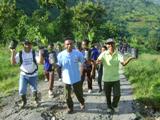Environment Promotion in Timor-Leste

Timor-Leste has taken not only internal commitments, as well as various international environmental obligations. Several Conventions have been ratified - such as the Vienna Convention and its Montreal Protocol, the United Nations Framework Convention on Climate Change and its Kyoto Protocol and the UN Convention to Combat Desertification, among others. By ratifying these documents, the country has assumed various duties in different environmental issues, and it is necessary to achieve them, including the development of laws to meet these obligations.
The environmental bases of the internal judicial order are being defined, integrating the concepts of internationally accepted environmental law. The proposal of a Base Law on Environment is already being drafted and should be submitted to the Council of Ministers for approval later this year. This crucial Base Law will be the legal basis for guiding the drafting of various complementary laws and regulations.
Some environmental legislation is already in effect, such as the important Decree-Law on the environmental licensing that regulates the allocation of environmental licenses to any project (such as construction and other interventions with direct impact on the environment), as well as its supervision, which ensures the prevention of negative environmental impact and pollution control.
In the context of adaptation to climate change, the preparation of the National Action Program for Adaptation (known as NAPA) is being completed. This program will introduce measures for the adaption to the adverse effects of climate change and to ensure that economic development is carried out sustainably.
The National Biodiversity Strategy and Action Plan, one of the requirements of the UN Convention on Biodiversity, is being completed and will serve as the main basis of the measures to be taken in relation to biodiversity conservation in the country
On the other hand, "The Secretariat of State for Environment has been focusing heavily on capacity development and training of human resources, encouraging employee participation in various conferences, workshops and training sessions, both nationally and abroad. To make this possible, the international support has been crucial, particularly from Norway, Japan and Indonesia, which have been major donors for human resources training", said the Secretary of State for Environment Abílio Lima.
Institutional strengthening has been developed to provide a more effective response at a specialized level. The main concerns in this area are being improved through the creation of a system for transmitting information between the different sectors, as well as the creation of decentralized infrastructure that can respond to environmental problems in different districts.
Another very important job, one that the Secretariat of State for Environment is developing, is the population's awareness to the problems of environmental degradation. "A number of awareness-raising activities, directed to the general public, and in particular districts, are being implemented in order to educate people on how to practice environmentally sound activities and provide educational information on the problems arising from environmental degradation, means of combating the impacts of climate change, disaster prevention, among other issues", said Abílio Lima.
In addition to these activities, the Secretariat of State for Environment has provided others, such as the distribution of plants in the districts, the establishment of coconut nurseries and also environmental awareness activities in schools aimed at the younger population.
Another function of the Secretariat of State is the inspection to how waste management from restaurants, hotels and shops is made in the country, as well as monitoring community activities regarding the sale of protected wildlife.
Finally, importance has also been given to the participation of Timor-Leste in regional initiatives such as the "Coral Triangle Initiative", a regional program involving six neighboring countries which aims to protect and conserve coral reefs in the geographic area.










































